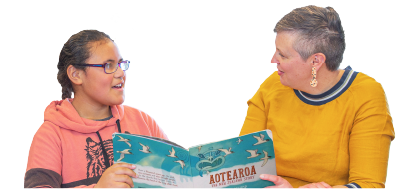What do you want teachers to know about your child?
Show video transcript
Title slide: What do you want teachers to know about your child?
Mary Jane Kauraka-Seiuli, Te Punanga o Te Reo Kuki Airani, Wellington
Children playing outside at the centre
That he’s unique, and that he loves community, he loves family. We have a very humble culture, very humble beginnings. And it's not all about educating the child, it’s about nurturing. At the end of the day it's all about love, you know.
Mary Jane Kauraka-Seiuli, Te Punanga o Te Reo Kuki Airani, Wellington, facing camera
If you can get a child to learn that they are loved and that it sort of reciprocates, so that when... I hope that when he transitions to school, that he fosters everyone around him that he loves them, he cares about them and their wellbeing. Because if you think about today with mental health, you know, our children are growing up and they're suffering and they don’t know how to sort of… regulate themselves, if you know what I mean. So I'm thinking that if I set my son in a language nest where he learns that everyone around him is loved, that he feels love, then he's going to grow up to know that he's got a support system no matter what obstacle he goes with through life.
Sene Kelisianom, Parent, Matiti Akoga Kamata (ECE), Wellington
Group of ECE students
I understand that there's opportunities for Pacific students to participate in some extracurricular activities or some cultural type activities within the school. It should be encouraged for them to participate.
Sene Kelisianom, Parent, Matiti Akoga Kamata (ECE), Wellington, facing camera
And thinking about culture as part of their wellbeing and not separating it out as an add-on kind of thing. Because if you treat the child as a whole, in their cultural identity and what they feel is added value to them in order to thrive and also grow into the person we would like them to become as an adult. It should be part of, it should be encouraged in the school environment after Akoga Kamata. That's what I would like for my children.
This video captures the voices of Pacific parents who share what they want teachers to know about their children. Their messaging includes a desire for teachers to build on their child’s sense of love and belonging, celebrate students’ unique cultural identities, and grow Pacific students’ confidence as learners.
Reflections for individual teachers:
As you watch this video think about your role as a teacher working within a Pacific context.
- What conversations have you had with the Pacific parents about their children? What have you learnt? How are you going to respond?
- How might you grow closer relationships with your Pacific parents to learn more about their children? How can you make them feel comfortable enough to share their perspectives and aspirations with you?
- The video calls for teachers to celebrate the cultural identities of Pacific learners and give them opportunities to participate in cultural activities at school. How do you build on the values and experiences of your Pacific learners and allow them to bring their cultural identities into your learning environment?
Reflections for staff or departments:
The New Zealand Curriculum encourages schools to seek out and listen to the ideas of students, parents, families, whānau, and the wider community when designing their local curriculum (The New Zealand Curriculum, p37). The following whakatauki outlines aspirations in Te Whāriki (p.12):
"Ehara taku toa i te toa takitahi engari he toa takitini. I come not with my own strengths but bring with me the gifts, talents and strengths of my family, tribe, and ancestors."
- What effective approaches do you use to hear and listen to Pacific parents stories?
- How might you strengthen your relationships with Pacific parents and families so that you can find out more about their children and find out about their values, aspirations, and priorities for teaching and learning?

